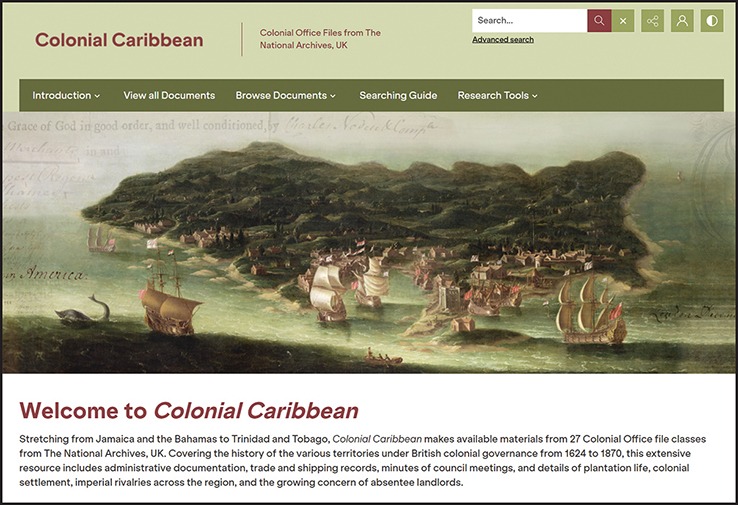Colonial Caribbean Module III: Economic Change and Indenture Labour, 1850–1870 | eReviews
This archive is a dynamic resource for faculty, students, and researchers interested in the economic, historical, and sociological challenges of the Caribbean in the late 19th century.
Colonial Caribbean
Content In contrast to AM’s first two modules in the Colonial Caribbean series, Module III covers a much shorter period—the volatile years between 1850 and 1870. During this time, English-controlled Caribbean territories underwent dramatic changes, including abolishing slavery and transitioning from an apprenticeship labor system to indentured servitude, a change that led to widespread poverty and strife. This resource draws upon volumes sourced from 21 Colonial Office series held at the National Archives, UK. Included are administrative documentation, correspondence, census data draft bills, land board papers, legislative acts, medical reports, newspapers, petitions, and proclamations. The collection includes 1,102 primary documents and 34 document types. In addition to the thousands of pages of financial and legal primary sources, it also contains a varied selection of maps, plans, illustrations, and diagrams.
Usability The home page features a navigation menu with dropdowns dedicated to either enabling access or enhancing the user experience. The introduction, searching guide, and research tools clearly and succinctly detail the archive’s features and best practices for maximizing search results. The other two dropdowns offer direct paths to the database’s contents, allowing users to view all documents or browse within subject areas. The home page’s prominently located basic search box has a link to an advanced-search page, a contrast button for viewing preferences, and options for sharing search results and creating individual accounts. Links to essays and video interviews, a visual gallery, a guide to colonies, and an interactive chronology in the teaching tools and research tools menus support classroom discussion and research assignments.
Users can search for documents by keyword, title, date, series, colony, theme, document type, and language through the advanced search or the “view all documents” page. Documents can be browsed by series, colony, theme, and governor. The options for browsing by theme are especially rich, offering access to 11 different subject areas. Portals to the subject areas are attractively displayed and serve as excellent guides to finding materials in core areas, including crime and punishment, slavery and emancipation, trade and shipping, and religion. The option for browsing by series allows researchers to narrow their searches by colony. Documents are quickly retrieved by selecting a colony and checking the module three filter in the “view documents” mode.
Individual documents have brief descriptions and extensive cross-references. Handwritten text recognition assists in document discovery. Text and visuals are of excellent quality, with options to enlarge, rotate, toggle, and zoom. Sharing and downloading options are plentiful.
Pricing The database is available for perpetual access with pricing tailored for each institution. Contact AM for custom price inquiries.
Verdict This archive is a dynamic resource for faculty, students, and researchers interested in the economic, historical, and sociological challenges of the Caribbean in the late 19th century. AM’s responsive platform offers a variety of ways to navigate between pages and menus. This module complements content in earlier modules and is a worthy addition to any library’s digital historical offerings.
Add Comment :-
RELATED
ALREADY A SUBSCRIBER? LOG IN
We are currently offering this content for free. Sign up now to activate your personal profile, where you can save articles for future viewing









